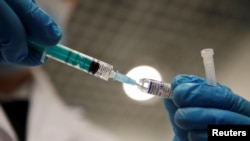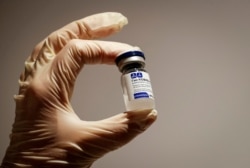The United States denounced Monday what it called a Russian disinformation campaign against U.S.-made COVID-19 vaccines, saying Moscow was putting lives at risk.
The Global Engagement Center, an arm of the State Department whose activities include monitoring foreign propaganda, said that Russian intelligence was behind four online platforms involved in a campaign.
The sites have "included disinformation about two of the vaccines that have now been approved by the FDA in this country," State Department spokesman Ned Price told reporters, referring to the U.S. Food and Drug Administration.
"It is very clear that Russia is up to its old tricks, and in doing so is potentially putting people at risk by spreading disinformation about vaccines that we know to be saving lives every day," Price said.
The Wall Street Journal first reported on the Global Engagement Center's findings, which said that the websites played up risks of the U.S.-made Pfizer-BioNTech and Moderna vaccines in an apparent bid to boost Russia's homegrown Sputnik V.
In an assessment provided last year to AFP, the Global Engagement Center said that thousands of Russian-linked social media accounts have run a coordinated campaign to undermine official narratives on COVID-19 including by spreading allegations of U.S. involvement.
The center found that China briefly made a similar effort but ultimately decided it made more traction by highlighting Beijing's own efforts.
U.S. intelligence has long suspected Russia in disinformation campaigns on health, including spreading the myth in the 1980s that U.S. scientists created the HIV virus that causes AIDS.





